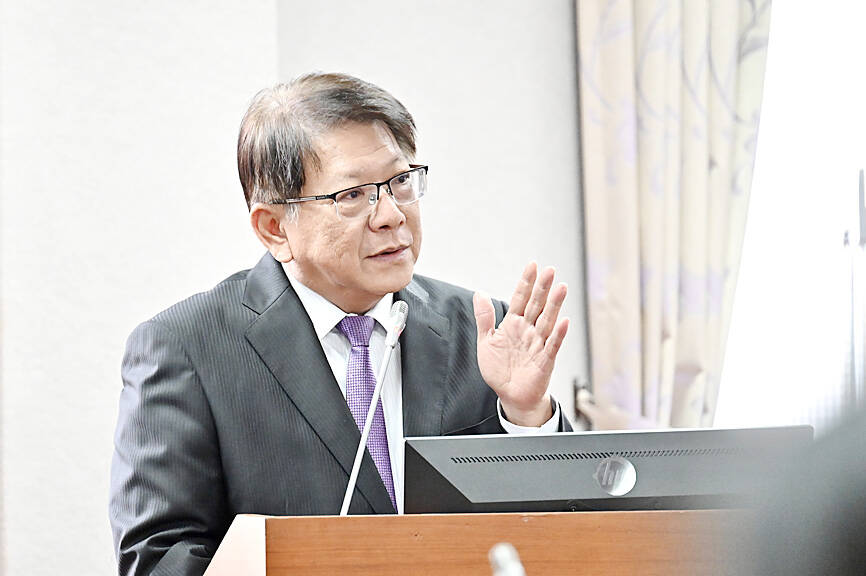President William Lai (賴清德) is to promulgate controversial laws passed by the Legislative Yuan last week, Presidential Office Secretary-General Pan Men-an (潘孟安) said yesterday.
The legislature approved amendments to the Constitutional Court Procedure Act (憲法訴訟法), the Public Officials Election and Recall Act (公職人員選舉罷免法) and the Act Governing the Allocation of Government Revenues and Expenditures (財政收支劃分法) on Friday last week.
Some have suggested that Lai could refuse to promulgate the laws, or that Premier Cho Jung-tai (卓榮泰) could refuse to countersign them, but Pan confirmed that both men would uphold the Constitution.

Photo: George Tsorng, Taipei Times
Asked what the president meant when he said “democratic disputes should be resolved with even greater democracy,” Pan said that Lai did not imply he would organize a referendum.
Instead, the government would consider all its options, such as the Cabinet requesting the legislature reconsider the amendments or petitioning the Constitutional Court to rule on their constitutionality, he said, adding that refusing to promulgate the bills is not an option.
The Executive Yuan has so far only received the amendments to the Constitutional Court Act, Cabinet spokeswoman Michelle Lee (李慧芝) said.
Once all three are received, the Cabinet would exercise its power to consider relief measures prior to the deadline on Thursday next week for the laws to be promulgated, Lee said.
The laws severely impact the administration’s ability to govern, including subsequent budgets and salary increases, and there is a high likelihood of the Cabinet filing an objection, she added.
The amendments to the Act Governing the Allocation of Government Revenues and Expenditures would result in a NT$375.3 billion (US$11.48 billion) reduction of the central government’s budget, the Directorate-General of Budget, Accounting and Statistics said.
The allocation of government revenue could reduce the defense budget by up to 28 percent, equivalent to about NT$80 billion, the Ministry of National Defense said on Wednesday.
The ministry crafted a budget based on its duty to safeguard the country and its operational needs, Deputy Minister of National Defense Hsu Yen-pu (徐衍璞) said yesterday.
If the proposed budget is not fully funded, it could affect the ministry’s plans to raise salaries for personnel, as well as other necessary projects such as Taiwan’s domestic submarine, Hsu said.
The budget cuts would have a “clear” impact on Taiwan’s diplomacy, Minister of Foreign Affairs Lin Chia-lung (林佳龍) said.
A 28 percent reduction for the Ministry of Foreign Affairs would be NT$6.5 billion, affecting the ministry’s exchanges with international organizations and allies, including embassy operations, Lin said.
Democratic Progressive Party caucus whip Ker Chien-ming (柯建銘) said the party would “exhaust” all its constitutional options in opposing the new bills, including requesting the Constitutional Court to provide an interpretation.
Additional reporting by CNA and Reuters

Taiwan is to commence mass production of the Tien Kung (天弓, “Sky Bow”) III, IV and V missiles by the second quarter of this year if the legislature approves the government’s NT$1.25 trillion (US$39.78 billion) special defense budget, an official said yesterday. Commenting on condition of anonymity, a defense official with knowledge of the matter said that the advanced systems are expected to provide crucial capabilities against ballistic and cruise missiles for the proposed “T-Dome,” an advanced, multi-layered air defense network. The Tien Kung III is an air defense missile with a maximum interception altitude of 35km. The Tien Kung IV and V

The disruption of 941 flights in and out of Taiwan due to China’s large-scale military exercises was no accident, but rather the result of a “quasi-blockade” used to simulate creating the air and sea routes needed for an amphibious landing, a military expert said. The disruptions occurred on Tuesday and lasted about 10 hours as China conducted live-fire drills in the Taiwan Strait. The Civil Aviation Administration (CAA) said the exercises affected 857 international flights and 84 domestic flights, affecting more than 100,000 travelers. Su Tzu-yun (蘇紫雲), a research fellow at the government-sponsored Institute for National Defense and Security Research, said the air

A strong continental cold air mass is to bring pollutants to Taiwan from tomorrow, the Ministry of Environment said today, as it issued an “orange” air quality alert for most of the country. All of Taiwan except for Hualien and Taitung counties is to be under an “orange” air quality alert tomorrow, indicating air quality that is unhealthy for sensitive groups. In China, areas from Shandong to Shanghai have been enveloped in haze since Saturday, the ministry said in a news release. Yesterday, hourly concentrations of PM2.5 in these areas ranged from 65 to 160 micrograms per cubic meter (mg/m³), and pollutants were

Taiwan’s armed forces have established response protocols for a wide range of sudden contingencies, including the “Wan Chun Plan” to protect the head of state, the Ministry of Defense (MND) said today. After US President Donald Trump on Saturday launched a series of airstrikes in Venezuela and kidnapped Venezuelan President Nicolas Maduro, concerns have been raised as to whether China would launch a similar “decapitation strike” on Taiwan. The armed forces regularly coordinate with relevant agencies and practice drills to ensure preparedness for a wide range of scenarios, Vice Minister of National Defense Hsu Szu-chien (徐斯儉) told reporters before a